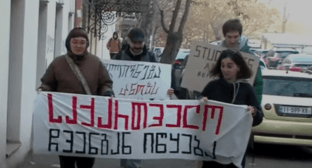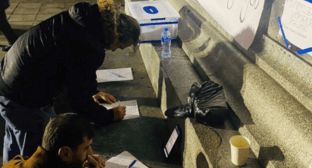30 August 2005, 21:52
Human rights defenders compare figures
One hundred and fifty-two residents of Chechnya were abducted in the first six months of 2005, according to the Human Rights Centre Memorial which monitors the situation in the republic. Of them, 58 were ransomed or freed in another way, six were found dead, 86 have disappeared, and two are under investigation. "The figures are much lower as compared with last year," Memorial's Dmitry Grushkin comments on the statistics to Caucasian Knot. "However, it is not to be forgotten that our monitoring comprises just 25-30% of the territory of Chechnya, mostly its plain districts. We only receive information from mountainous districts occasionally. Therefore, we believe that actual figures are 3-4 times higher."
Earlier today, Arkadii Yedelev, Deputy Internal Affairs Minister of Russia and Commander of the Regional Operations Headquarters (ROH) for the Counter-Terrorist Operations in the North Caucasus Region, announced a considerable reduction of the number of abductions in Chechnya.
"The number of abducted persons was more than 2.5 times lower in 2004 as compared with 2003. The number of abductions also reduced by more than 50% during six months of 2005 as compared with the same period a year earlier," Mr Yedelev told Interfax. According to the ROH commander's information, 513 such crimes were registered in 2003, 164 in 2004, and 79 in the first half of 2005. "By the way, such crimes are currently quicker and more often detected," emphasised Mr Yedelev.
Meanwhile, Mr Grushkin is sure that officials are "simply shuffling figures, manipulating them as they see convenient and useful."
"We do observe a certain reduction of the number of abducted people, but it is not as significant as ROH representatives announce it to be," says the human rights defender. "The fact should also be taken into account here that many relatives of those abducted are so disillusioned about legal institutions and even human rights organisations that they do not go to the prosecutor's office or police, but try to free their relatives on their own. Accordingly, these instances are not registered in any reports. This growing trend is confirmed by increase in the number of abducted people who are ransomed or freed in another way as compared with previous years. People distrust law enforcement and security agencies. They rely only on themselves. Even when they are released, people make no haste to lodge complaints or inform anyone about the committed crime. The principle is 'ransomed, alive, thank God.'"
As an example, Mr Grushkin reminded of the abduction of Aslan Maskhadov's relatives in December 2004. "The relatives of the abducted people applied to the Prosecutor General's Office and human rights organisations only 1.5 months after the abduction," says the human rights defender.
"Of course, the situation with abductions in the Chechen Republic seems to have improved, especially when official figures are examined. But at the same time, the state of affairs in Chechnya is not as adequate as those officials who talk about lower numbers of abductions picture it," concludes Dmitry Grushkin.
"Repressions against relatives of rebels, including their hostage-taking, on the part of law enforcement and security agencies and the military became much more widespread and systemic by 2004 after so-called 'Chechenisation' of the conflict than they had been in the first four years of the war. While repressive actions against the families of combatants were either revenge or a method to obtain information previously, such methods have now become tactics of exerting pressure on rebels to make them surrender."
The human rights advocate thinks abductions and "counter hostage-taking" is mostly carried out by officers of Chechen law enforcement and security agencies. "Such actions are encouraged at the highest level," says Mr Grushkin. "Shortly before his depth, at the funeral banquet for the Yamadayev family in Gudermes on 1 May 2004, President Akhmat Kadyrov claimed he would punish all relatives of armed resistance members. Literally in a month, on 9 June, Ramzan Kadyrov told NTV television channel in an interview, 'We would punish their relatives by the law.'"
In the opinion of the Memorial representative, however, "such actions only yield a negative result."
"For Chechen men the inability to protect their women and old relatives who are captured most often is a grave blow on self-esteem," Mr Grushkin believes. "This method is not only vicious in itself, but it is also ineffective because it intensifies the motivation of opponents to the federal government."
"As one former hostage said, 'they also have relatives.' And indeed, we register that such methods of "counter-terrorism" lead to further embitterment of resistance and worsen the situation which is disastrous even without that. For example, in the spring of 2004 we registered punitive actions on the part of rebels against Kadyrov's relatives. That is, 'counter hostage-taking' is by no means the appropriate method to solve the problem of bringing constitutional order to the Chechen Republic," said Mr Grushkin.
More info:
Author: Alexander Grigoriev, CK correspondent




